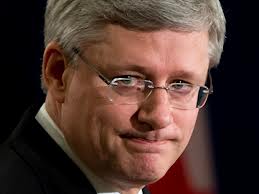If Stephen Harper lies awake nights, tossing and turning, the cause of his sleeplessness is probably not the impasse between Israel and Hamas or the territorial ambitions of Vladimir Putin in Ukraine. More likely, the cause is closer to home: in the ornate red chamber of the Senate of Canada.
The Senate is Harper’s great frustration. He can’t abolish it or reform it; the Supreme Court won’t let him unless the provinces buy in. And, despite packing the place with political supporters, he can’t control it, as the Senate expenses scandal makes clear.
The Conservatives’ fear now is that the Senate scandal — which stubbornly refuses to go away — will do to them what the Sponsorship scandal did to another majority government, a Liberal one, a decade ago. Although the Sponsorship scandal occurred on the watch of Jean Chrétien, it was his Liberal successor, Paul Martin, who paid the political price, losing his majority in the 2004 election, then going down to defeat to Harper’s Tories in 2006.
Could history repeat itself? Compared to Sponsorship, the Senate scandal is a picayune affair, the public funds being counted in the hundreds of thousands compared to Sponsorship’s hundreds of millions. However, two elements elevate the Senate affair to the level of Sponsorship, or beyond. The first is the direct involvement of parliamentarians — members of the Senate — who are being charged with fraud and abuse of trust. In Sponsorship, the axe fell on civil servants, party hacks and advertising company executives.
The second element is the involvement of the prime minister and his inner circle. A decade ago, Chrétien was able to argue that, although the Sponsorship program was controlled by his office, he did not know — nor did he want to know — how funds were diverted into the hands of friends of the Liberal Party. He had deniability, plausible if not entirely convincing.
Deniability cannot provide cover for Harper. He appointed the three senators at the heart of the scandal, Mike Duffy, Pamela Wallin and Patrick Brazeau. He chose them not because he wanted them to be fearless legislators. He knew, or should have known, that none of the three actually lived in the region they were supposed to represent. That didn’t matter (not until Duffy’s purported principal residence, a cottage on Prince Edward Island, became central to a $90,000 expense claim).
The PM chose them because he wanted them to go forth and preach the party gospel, raise money and win voters for the Conservatives. It was as cynical as it was unethical.
The party should have paid for travel and other expenses. Instead, many of those expenses got charged to the Senate, which either didn’t notice or care. The PMO didn’t care, either, until an independent audit picked up some of the abuses about four years after they began.
The cover-up further distinguishes the Senate scandal from the Sponsorship scandal. It was mounted at the highest level, and it has the prime minister’s fingerprints are all over it. Harper knew about Duffy’s expense problem, because the senator told him about it following a weekly caucus meeting.
Moving into damage-control mode, senior officials of the Conservative party secretly went to work with the PMO to make Duffy’s problem go away; Harper was kept aware of this effort. In the end, Nigel Wright, Harper’s chief of staff, wrote a personal cheque for $90,000. But the problem didn’t go away. When CTV broke the news of Wright’s cheque, Harper fired his chief of staff.
Meanwhile, the three errant senators were kicked out of the Conservative caucus, then suspended without pay from the Senate. The Senate called in the RCMP to investigate Pamela Wallin’s expense claims. Auditor General Michael Stephen Harper, Ferguson is preparing a full report on Senate expenses. Mike Duffy has already been charged with 31 offenses, including fraud and breach of trust. He proposes to call Harper as a defence witness if he goes on trial.
Sleepless on Sussex Drive? It’s not surprising.
Cambridge resident Geoffrey Stevens, an author and former Ottawa columnist and managing editor of the Globe and Mail, teaches political science at Wilfrid Laurier University and the University of Guelph. His column appears every Monday in Waterloo Region Record and Guelph Mercury. He welcomes comments at [email protected]



